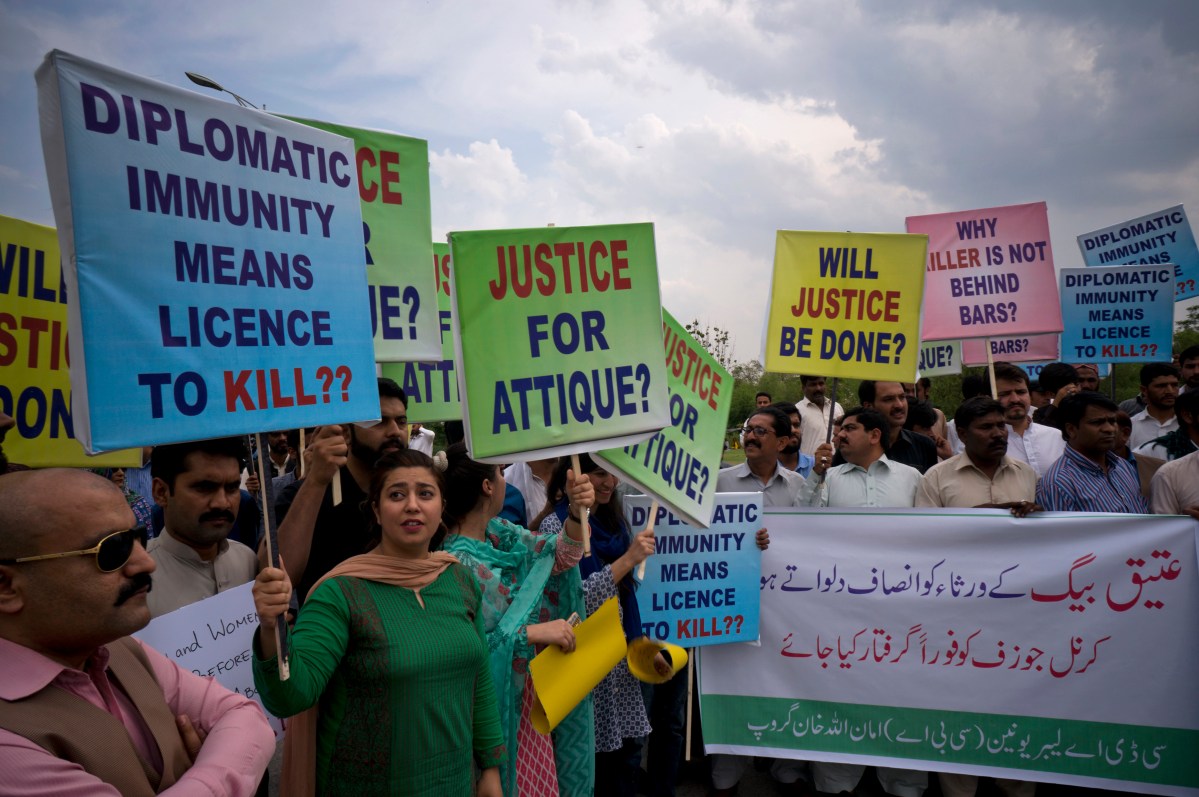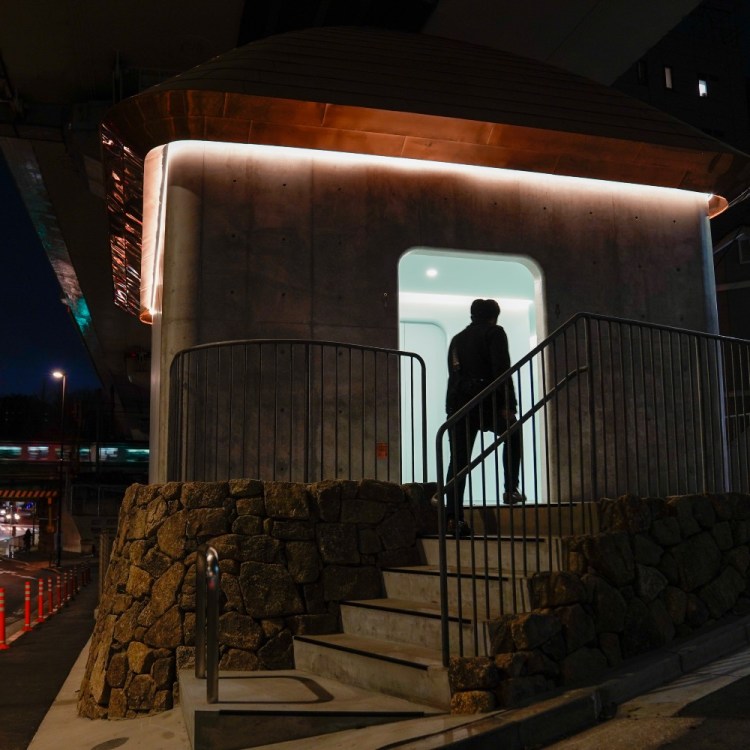The CCTV video isn’t high-resolution, but it’s clear enough to be disturbing. A white vehicle climbs up a small hill to an intersection and drives on through. At the same time, a motorcycle with two men on it enters the frame from the left, heading on a perpendicular course.
Neither driver sees the danger until it’s too late. The white vehicle’s brake lights come on just a moment before it slams into the bike, striking the motorcycle at a broadside and sending the two riders flipping off the bike, into the air and then down to the pavement.
One of the men was hurt and the other, 22-year-old Ateeq Baig, was killed.
What was already a personal tragedy in Islamabad, Pakistan, however, grew into the beginnings of an international crisis when the driver of the white vehicle was revealed to be an American embassy official, defense attaché Col. Joseph Hall and it was alleged he had run a red light just before impact. Geopolitically, it was not a good time for an American official to have been involved with the death of a Pakistani national.
“The relations [between the U.S. and Pakistan] had been cooling considerably; they were on a down-slide, particularly with the arrival of the new administration in Washington, but even before that the Obama administration had cooled off considerably,” Shuja Nawaz, distinguished fellow at the Atlantic Council’s South Asia Center, told RealClearLife. “This particular incident really came out of the blue.”
Robert Grenier, a former CIA station chief for Pakistan and Afghanistan, said that with relations so tense, such an incident could “fan the flames.”
The accident happened early last month but received relatively scant attention in the news-saturated American media, and U.S. State Department spokespeople have generally refused to discuss it in any detail. The U.S. Embassy in Islamabad released a short statement the day after the incident expressing “its deep sympathy to the family of the deceased and those injured in a tragic traffic accident involving a U.S. Embassy vehicle on Saturday, April 7.”
The controversy has been all over the Pakistani press, however, and there were calls for Hall to be tried in a Pakistani court. When the U.S. tried to get Hall out of the country in mid-May, the Pakistani government blocked him from leaving and reportedly added him to a kind of no-fly list. All the while, the U.S. government insisted that Hall’s diplomatic immunity be recognized under international law.
Though kept much further under the radar, the Hall ordeal was becoming a troubling echo of the Raymond Davis affair that nearly bottomed-out U.S.-Pakistani relations in 2011. In that case, Davis, a CIA contractor, shot and killed two men who he believed were about to do him harm on the streets of Lahore, Pakistan. After a mob surrounded Davis, he was taken into custody. Again the U.S. — all the way up to then-President Barack Obama — claimed Davis was a diplomat who enjoyed immunity and should be immediately released.
But there was a complicated dispute about Davis’ status as a “diplomat,” and he was held for 49 days as the U.S. and Pakistan struggled to find a way to dissolve the crisis.
The solution, in part, was “blood money.” Under Pakistani law, the alleged perpetrator of a crime can provide financial compensation to the victim or the victim’s family and avoid criminal prosecution. To get Davis home, the families of the men he killed received more than $2 million. At the time, Secretary of State Hillary Clinton said the U.S. would not pay compensation directly, but a White House official told ABC News the U.S. government expected to “receive a bill for money paid to the families.”
The Hall ordeal ended last week when Pakistani authorities finally allowed him to board a plane for the U.S. On Monday a spokesperson for the State Department declined to tell RealClearLife whether “blood money” was paid to anyone, but Nawaz said he thought it unnecessary and unlikely.
“The other thing that is incontrovertible is [Hall] did have diplomatic status as an attaché. So, under that rule, the host country can request or demand that the U.S. waive his immunity so that he can be tried and the U.S. has the right to say, ‘No,’” Nawaz said.
Nawaz and Grenier said that compared to the Davis case, the U.S. was on much firmer ground to claim immunity. “It’s pretty straightforward,” Grenier said.
Pakistani news reports showed what they said was Hall’s official I.D., which clearly identifies him as a U.S. Defense and Air Attaché and shows the word “Diplomat” in large red letters above his photo. Grenier said that Pakistanis may have delayed Hall’s exit from the country only to ensure he had proper status and to avoid being accused of “leniency.”
“So after some fits and starts, the rules prevailed and he was allowed to come back,” Nawaz said.
Grenier said that some financial compensation could still happen, but if so it would be more likely a kind of humanitarian gesture.
There are indications that just such a gesture may be made. Pakistan’s The Nation reported last week that the father of the deceased, Muhammad Idrees, said he filed a statement of pardon for Hall after he was assured of some compensation, he believed, from the Pakistani government. The day before, a cousin reportedly told another local news outlet that some kind of settlement had been reached. Officials at the Pakistani embassy in Washington, D.C. and in the Interior Ministry in Islamabad have not responded to a request for comment for this report as of publication.
Nawaz said that with regard to U.S.-Pakistan relations, the fatal incident was larger than a pebble but smaller than a boulder. The more immediate impact of the case could be the dual diplomatic travel restrictions imposed by Pakistan and the U.S. in the wake of the accident. A spokesperson for the Pakistani foreign ministry said last week diplomats in both countries now have to ask the host country’s permission to travel more than 25 miles from the capital.
It’s a condition that can seriously hamper diplomatic work and one normally reserved for “unfriendly” nations, Nawaz said. “This is not a friendly act,” he said.
Grenier, who also served as the head of the CIA’s Counterterrorism Center, said the movement restrictions could also disrupt intelligence gathering in each country — a particularly troubling prospect for American eyes and ears in a dangerous part of the world.
“I think it is a big deal,” he said. “When you see it in the context of U.S.-Pakistani relations, I’m not aware of the last time that something like this was done for reasons other than security reasons. This is not a good sign. Not a good sign.”
This article was featured in the InsideHook newsletter. Sign up now.























